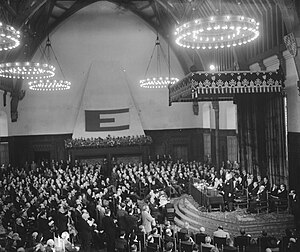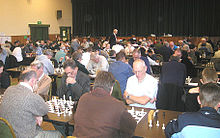|
Congress A congress is a formal meeting of the representatives of different countries, constituent states, organizations, trade unions, political parties, or other groups.[1] The term originated in Late Middle English to denote an encounter (meeting of adversaries) during battle, from the Latin congressus.[2] Political congressesInternational relationsThe following congresses were formal meetings of representatives of different nations:
LegislaturesIn the mid-1770s, the British colonies that became the United States of America adopted for their joint convention the word "Congress" - to emphasize each colony's status as a state in its own right.[citation needed] The term has since been adopted by many countries to refer to their legislatures.
Non-presidential systems
PartiesMany political parties have a party congress every few years to make decisions for the party and elect governing bodies, while others call it a party convention. Congress is included in the name of several political parties, especially those in former British colonies:
Political organizationsLabor congresses
Religious Congresses
Non-political congressesCongress is an alternative name for a large national or international academic conference. For instance, the World Congress on Men's Health is an annual meeting on men's medical issues. Organizations in some athletic sports, such as bowling, have historically been named "congresses". The predecessors to the United States Bowling Congress (formed in 1995) were the American Bowling Congress (founded in 1895) and the Women's International Bowling Congress (founded in 1927).  A chess congress is a chess tournament, in one city, where a large number of contestants gather to play competitive chess over a limited period of time; typically one day to one week, or more. References
External linksLook up congress in Wiktionary, the free dictionary.
|